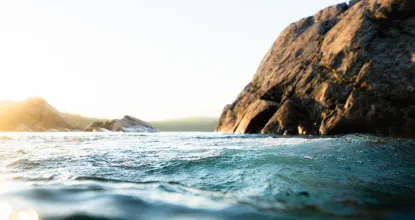Workshop & Excursion Types
Music
Songwriting & Poetry Workshop: What Comes After Wonder? Nature as Muse.
3-day Workshop with Nikki Wallschlaeger & Sue Demel
Songwriters and poets have always expressed their awe at the natural world in their work. Together, we'll walk local trails, looking closely at the moss, bark, bugs, birds, and shoreline, to find and reflect on our sources of inspiration. We'll spend three days crafting and workshopping poems and songs to find and tell our most important stories, inspired by the UP's landscape.
Songs & Writing as Activism
3-day Workshop with Martin Reinhardt & Devi Lockwood
At a time when the climate crisis and human rights issues haunt us each day, we can turn to the world around us to find our grounding. Walk the trails and riverways with Martin Reinhardt and Devi Lockwood to talk about how we continue to find inspiration and joy outdoors while crafting stories and songs to advocate for change in the world. We'll spend three days writing, wandering, and workshopping together.
Guitar: Beyond Standard Tuning – Level: Intermediate
When beginning to play the guitar, everyone learns how to play chords in standard tuning (EADGBE). But that is only scratching the surface of the harmonies your can create on the “git-box.” Dan Truckey will show you a few simply alternate tunings and how they can be used to give your playing a whole new lease on life.
Fiddle: Just fiddling around – Level: Intermediate
Learning a tune on the fiddle isn’t difficult, you just need someone to show you the way. That’s what NMU orchestra director Barb Rhyneer will do and by the end of the workshop you’ll be able to play some popular folk melodies.
Mandolin: You Don’t Slice Potatoes with that Thing – Level: Beginner
The mandolin’s roots are in Italy, but the instrument is now a standard in folk music around the world. Whether it be Celtic, Bluegrass, Country or Americana, the mandolin is everywhere. Brent Graves will show you the basics of how to get started with playing this 8-string work of art.
Banjo & Bass
The much-maligned banjo is one of America’s oldest folk instruments and a true melting pot of cultures and types of instruments. The bass’ low simple note lines are key to grounding any band, folk, rock, jazz or blues. John Gillette and Sarah Mittlefelhdt co-lead this workshop, showing students how the banjo and bass can work together, and dispelling many of the myths and challenges one faces when playing these instruments (including that banjo players will lose all their friends).
Percussion: Bang, Pop, Snap – Level: Beginner
Percussion is more than sticks, drums and cymbals. Sometimes it is just your hands by themselves. Sometimes your instrument is an old candy tin. Regardless, Tim DeMarte will show you how to make the most of your percussion instrument of choice.
Ukulele: Where do my fingers go? – Level: Beginner
One of the most popular instruments in the world, the Ukulele is relatively simple to learn. However, there may only be four strings but where do you start? Well, Jeff Krebs will help you learn basic chords and strumming patterns. After this workshop, you’ll be up and strumming in no time.
Film
Image

How to Make Documentary
3-day Workshop:
In collaboration with Fresh Coast Film Festival, this workshop will teach you the fundamentals of making a documentary short, from designing your project to editing techniques. This will be offered at a time that will allow participants to take any of the writing workshops along with this one.
Outdoor Recreation
Image
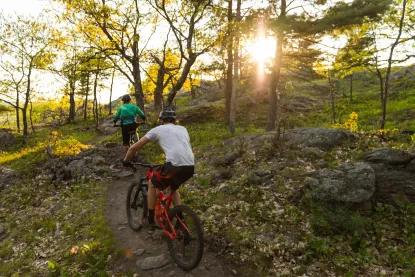
Biking & Energy
Definitions of energy range from the physics-based “capacity to do work” to human-centered ideas of physical vitality, creative or enterprising ambition, or mental health & resiliency.
Our modern society depends on the availability of low-cost, reliable energy, sourced from fossil fuels, nuclear reactors, or renewable sources such as the sun, wind, or flowing rivers. These energy sources all draw from our environmental resources, but also have impacts on the environment from climate change to visible and invisible pollutants to built structures that alter our landscapes. As individuals, our physical, mental, creative, and emotional energies also draw from our environment. Time spent in natural settings has been linked to improved mental focus, increased empathy, reduced stress, decreased risk of psychiatric disorders, and other benefits.
On this trip, we will bike on Noquemanon Trail Network’s North Trails past the Marquette Bureau of Light and Power facilities for generating electricity from natural gas, a community solar garden, and hydropower. Along the way, you may reflect on any or all definitions, sources, uses, and impacts of energy. The length and difficulty of the route will depend on the participants, but will include some unpaved trail and gravel road. (The trip leader's expertise lies in the physics and athletic ideas of energy, but she's happy to ponder (embrace and chat about all other meanings too.)
Image
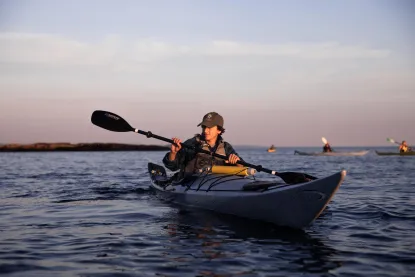
Canoe & Kayak
The Great Lakes contain 20% of the world’s freshwater supply and of that supply, Lake Superior consists of about half of the total volume. Given its size and geopolitical context, Lake Superior is an important place to explore how coastal communities are planning for climate change. Yet when we try to envision what the future of coastal development looks like along Lake Superior, how do we know what to expect? What can the environmental humanities contribute to planning and policies that aim for a more sustainable future?
As we canoe along the Dead River to the mouth of Lake Superior, we will discuss ways in which the environmental humanities can shape policy and planning related to sustainable development and coastal planning. You will join leaders of the Coastlines & People project to learn about regional efforts that have brought together people with disparate perspectives—including historians, scientists, tribal authorities, business leaders, planners, and concerned citizens—to understand the past, present, and future of coastal development in our area. The project emphasized the need for interdisciplinary collaboration to understand dynamic relationships between ecosystem health and development in communities along Lake Superior’s south shore. For more on the Coastline & People project click here.
Image
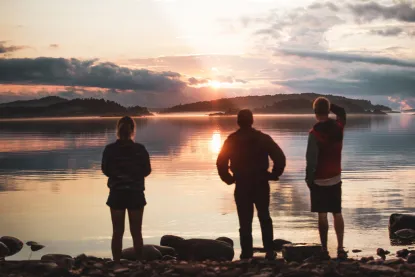
Hike
Nanabush University at Ashkikomaani-neyaashi (Presque Isle, Marquette, MI)
Together we will explore Anishinaabeg language, research, and education activities while visiting Ashkikomaani-neyaashi (Presque Isle). We will discuss our participation in having an ethical relationship with Anishinaabewakiing, the Great Lakes Northwoods, in response to Leanne Betasamosake Simpson’s “Land as pedagogy: Nishnaabeg intelligence and rebellious transformation”, and Sâkihitowin Awâsis’ “Gwaabaw: Applying Anishinaabe harvesting protocols to energy governance”.
Image
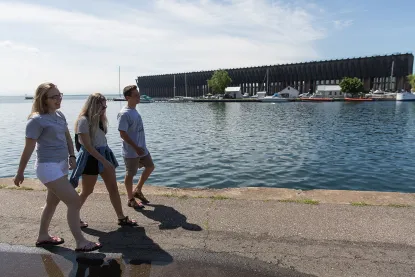
Walking tour of Marquette
Learn about Marquette's environmental and built history on this walking tour through town.
